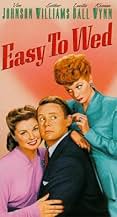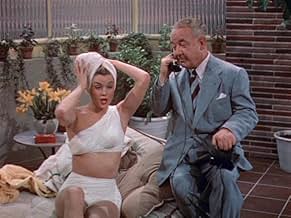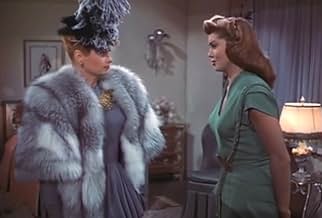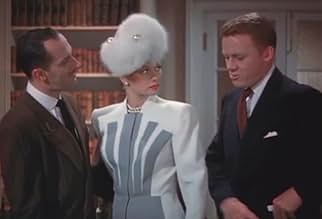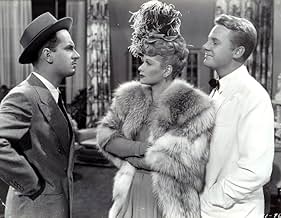To prevent a libel case against the paper, a reporter tries to compromise the reputation of a tycoon's slandered daughter.To prevent a libel case against the paper, a reporter tries to compromise the reputation of a tycoon's slandered daughter.To prevent a libel case against the paper, a reporter tries to compromise the reputation of a tycoon's slandered daughter.
Carlos Ramírez
- Carlos Ramírez
- (as Carlos Ramirez)
William Bailey
- Newspaper Office Worker
- (uncredited)
Featured reviews
As the other comments here indicate, it's highly instructive to compare LIBELED LADY to this remake, EASY TO WED. A decade brought a huge difference in style between the Thalberg-approved slangy courtship of slapstick repartee and the plush, earnest romance of Louis B. Mayer's MGM of the '40s.
Lucille Ball steals this picture with a very well-judged comic performance, aided by director Edward Buzzell, who clearly throws many scenes her way. What will surprise those who know her primarily from "I Love Lucy" is to see how much of her comic shtick is already on view here, completely developed and intact. The drunk scene, the little voices, the 'takes,' stares, reactions and expressions are familiar in every way as Lucy Ricardo. Ball also never looked more beautiful than in this film, with her hair as metallic and bright as a new penny, and in a series of witty and gorgeous costumes by Irene, who does just as well by Esther Williams.
But those who are critical of Ball's performance, particularly in contrast to Jean Harlow's in LIBELED LADY, are right. Harlow was a natural, a wonderful, winning and unique personality, whose blustering scenes of anger were always justified, always expressing her common sense and dignity. The dirty little secret about why Lucille Ball never made it as a movie star was that despite her professionalism and beauty, she was essentially a strident and cold personality. What Harlow did naturally, Ball works very hard to achieve so that we admire her pyrotechnics without ever warming up to her. By the time of "I Love Lucy" she had begun to disguise her intensity with clutziness and feigned vulnerability and stupidity. And like Katharine Hepburn, she learned that if Lucy was reined-in by a man once in a while, audiences could forgive her for her aggressiveness.
There is relatively little of Esther Williams' swimming in this picture. At this mid-'40s point, MGM was pushing her versatility to see just how much she could do, how far she could go. I happen to think that her screen presence (even when out of the water) is underrated. She had a refreshing, no-nonsense self confidence that is very American, and she was sexy in a way that is never blatant. The fact that this statuesque beauty with her strong physical presence and perfect carriage never acts seductively or coyly creates an unexpected sexual tension, especially in her early films (she lost a bit of it later as her body became thicker and more athletic). You can see how some would feel moved to ruffle her composure, warm her up, 'get' to her in some way, because she seems oblivious to her femininity while brimming over with it. Which is what makes her seem an emblematic American movie star. In the first half of this picture she gives a good account of the kind of frigid glamor girl that Alexis Smith often played at Warners.' When she finally melts, it's lovely, though she is better photographed in both THRILL OF A ROMANCE and THIS TIME FOR KEEPS (where she rates closeups by Karl Freund that make her look almost impossibly, lustrously beautiful).
A word about MGM's '40s Technicolor -- I love it. Many films from this period as screened on TCM seem to have been saved, restored, remastered for video tapes and DVDs. All of Esther Williams' color films from the mid-'40s are a visual treat with bright, deeply saturated color and sharp images, though a few scenes in EASY TO WED seem unaccountably muddy and soft, with desaturated color. And in one scene Ball wears a frosty blue costume that we have been told is green. Maybe they should take a look at this print before they put this film out on DVD.
Lucille Ball steals this picture with a very well-judged comic performance, aided by director Edward Buzzell, who clearly throws many scenes her way. What will surprise those who know her primarily from "I Love Lucy" is to see how much of her comic shtick is already on view here, completely developed and intact. The drunk scene, the little voices, the 'takes,' stares, reactions and expressions are familiar in every way as Lucy Ricardo. Ball also never looked more beautiful than in this film, with her hair as metallic and bright as a new penny, and in a series of witty and gorgeous costumes by Irene, who does just as well by Esther Williams.
But those who are critical of Ball's performance, particularly in contrast to Jean Harlow's in LIBELED LADY, are right. Harlow was a natural, a wonderful, winning and unique personality, whose blustering scenes of anger were always justified, always expressing her common sense and dignity. The dirty little secret about why Lucille Ball never made it as a movie star was that despite her professionalism and beauty, she was essentially a strident and cold personality. What Harlow did naturally, Ball works very hard to achieve so that we admire her pyrotechnics without ever warming up to her. By the time of "I Love Lucy" she had begun to disguise her intensity with clutziness and feigned vulnerability and stupidity. And like Katharine Hepburn, she learned that if Lucy was reined-in by a man once in a while, audiences could forgive her for her aggressiveness.
There is relatively little of Esther Williams' swimming in this picture. At this mid-'40s point, MGM was pushing her versatility to see just how much she could do, how far she could go. I happen to think that her screen presence (even when out of the water) is underrated. She had a refreshing, no-nonsense self confidence that is very American, and she was sexy in a way that is never blatant. The fact that this statuesque beauty with her strong physical presence and perfect carriage never acts seductively or coyly creates an unexpected sexual tension, especially in her early films (she lost a bit of it later as her body became thicker and more athletic). You can see how some would feel moved to ruffle her composure, warm her up, 'get' to her in some way, because she seems oblivious to her femininity while brimming over with it. Which is what makes her seem an emblematic American movie star. In the first half of this picture she gives a good account of the kind of frigid glamor girl that Alexis Smith often played at Warners.' When she finally melts, it's lovely, though she is better photographed in both THRILL OF A ROMANCE and THIS TIME FOR KEEPS (where she rates closeups by Karl Freund that make her look almost impossibly, lustrously beautiful).
A word about MGM's '40s Technicolor -- I love it. Many films from this period as screened on TCM seem to have been saved, restored, remastered for video tapes and DVDs. All of Esther Williams' color films from the mid-'40s are a visual treat with bright, deeply saturated color and sharp images, though a few scenes in EASY TO WED seem unaccountably muddy and soft, with desaturated color. And in one scene Ball wears a frosty blue costume that we have been told is green. Maybe they should take a look at this print before they put this film out on DVD.
This film has its plusses -- Esthers swimming, her swimming, and her swimming. It's also in technicolor, which is always a treat to the eye. It really surprised me that a socco screenplay that made 1936's Libled Lady such a rip-roaring funny film could go so flat 10 years later. Of course Myrna Loy, Jean Harlow, William Powell, and Spencer Tracy were more highly skilled performers than this cast. Williams has some to the stoic, amused calm that Loy had and she does okay as Connie, but Lucille Ball is almost unfunny in this, which really surprised me. She lacks Harlows warmth and vulnerability and timing. Harlow really carried Libled Lady and one always looks forward to her scenes. Ball is too arch and steely here. It puts a damper on the films success.
The film Easy To Wed had an impossible task to follow the film and stars of one of the best screen comedies ever made Libeled Lady. I would take nothing away from Van Johnson, Esther Williams, Lucille Ball, and Keenan Wynn. But frankly they're all not a patch on the quartet of William Powell, Myrna Loy, Jean Harlow, and Spencer Tracy.
Music and MGM technicolor is what distinguishes this film and the music primarily Latin in origin is pretty good and comes from a variety of sources. Colombian singer Carlos Ramirez contributes a native song and Ethel Smith plays her famous Tico Tico on the organ. Part of the film is set in Mexico so these acts are brought in without any strain on the plot. When the stars do their numbers, the results are pretty tepid.
Esther Williams stays fairly dry in Easy To Wed. Only a dip on a water slide and a brief swim in the family pool where she unplugs a rubber raft and sends Van Johnson into the water are all you see of her. No classic water ballets in Easy To Wed which must have disappointed her fans tremendously.
In Libeled Lady the character Loy/Williams's father is played by Walter Connolly and he's an avid fisherman. Here he's a hunter and Van Johnson has to take a crash course in duck hunting to make an impression on father Cecil Kellaway. Van's best moments like William Powell's in the first film are in the hunting scenes.
The basic outline of the story remains the same. A false story about heiress Esther Williams's romantic escapades has caused a lawsuit to be filed by Cecil Kellaway. Editor Keenan Wynn postpones for the umpteenth time his wedding to Lucille Ball to meet the crisis at the paper.
Wynn's plan, to hire back his ace reporter Van Johnson and marry his girl friend Ball to Johnson and then have Johnson strike something up with Williams. Just as Jean Harlow did, Lucille Ball amazingly enough goes along with this madcap scheme.
Everybody performs well, but after you've seen Libeled Lady you will think of Easy To Wed as a road company version of that classic.
Music and MGM technicolor is what distinguishes this film and the music primarily Latin in origin is pretty good and comes from a variety of sources. Colombian singer Carlos Ramirez contributes a native song and Ethel Smith plays her famous Tico Tico on the organ. Part of the film is set in Mexico so these acts are brought in without any strain on the plot. When the stars do their numbers, the results are pretty tepid.
Esther Williams stays fairly dry in Easy To Wed. Only a dip on a water slide and a brief swim in the family pool where she unplugs a rubber raft and sends Van Johnson into the water are all you see of her. No classic water ballets in Easy To Wed which must have disappointed her fans tremendously.
In Libeled Lady the character Loy/Williams's father is played by Walter Connolly and he's an avid fisherman. Here he's a hunter and Van Johnson has to take a crash course in duck hunting to make an impression on father Cecil Kellaway. Van's best moments like William Powell's in the first film are in the hunting scenes.
The basic outline of the story remains the same. A false story about heiress Esther Williams's romantic escapades has caused a lawsuit to be filed by Cecil Kellaway. Editor Keenan Wynn postpones for the umpteenth time his wedding to Lucille Ball to meet the crisis at the paper.
Wynn's plan, to hire back his ace reporter Van Johnson and marry his girl friend Ball to Johnson and then have Johnson strike something up with Williams. Just as Jean Harlow did, Lucille Ball amazingly enough goes along with this madcap scheme.
Everybody performs well, but after you've seen Libeled Lady you will think of Easy To Wed as a road company version of that classic.
This is one of the few times at MGM Lucy was given a chance to exploit her full comedic range, and she goes at it with gusto. From the moment she makes her whirlwind entrance looking absolutely gorgeous in a white wedding gown, she commands the screen whenever the camera is on her. In fact, though the movie ostensibly "stars" Van Johnson and Esther Williams, the bland leads take a back seat to the lively pairing of Lucy and Keenan Wynn, as her somewhat morally corrupt boyfriend. Forget comparisons to "Libeled Lady"; "Easy to Wed" is of a different era, and much more slapsticky, and, as noted, Lucy is a gem whether getting drunk and playing the piano or evincing true pathos as a wronged woman. She has rarely been photographed more appealingly, either.
Lucy obviously had her talents (though I'm not much of a fan of her television stuff) and she has a few good scenes here. But watching her do the big blow up speech at the end word for word the same as Jean Harlow, we see she had nowhere near the talent as Harlow. Harlow did that scene with such humanity and timing. This had none of that.
I almost never see the reason for remakes, very few are anywhere near as good as the original and this is a great example. Watch the original, much better.
I almost never see the reason for remakes, very few are anywhere near as good as the original and this is a great example. Watch the original, much better.
Did you know
- TriviaA remake of one of the great comedies of the 1930s - Une fine mouche (1936) with Jean Harlow, William Powell, Myrna Loy, and Spencer Tracy.
- Quotes
William Stevens 'Bill' Chandler: You're too modest. Why, you're a woman of great depths, depths that have never been plumbed.
Gladys Benton: [referring to her boyfriend] No, Warren's not much of a plumber.
- ConnectionsFeatured in Lucy and Desi: A Home Movie (1993)
- SoundtracksContinental Polka
Lyrics by Ralph Blane
Music by Johnny Green
Sung and Danced by Lucille Ball (dubbed by Virginia Rees) and chorus
- How long is Easy to Wed?Powered by Alexa
Details
- Release date
- Country of origin
- Language
- Also known as
- Que siga la boda
- Filming locations
- Production company
- See more company credits at IMDbPro
Box office
- Budget
- $1,683,000 (estimated)
- Runtime1 hour 50 minutes
- Aspect ratio
- 1.37 : 1
Contribute to this page
Suggest an edit or add missing content



